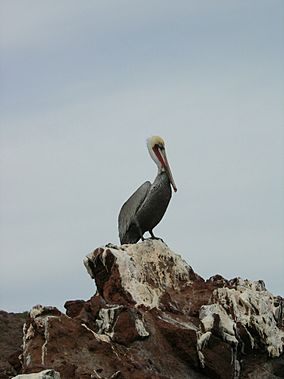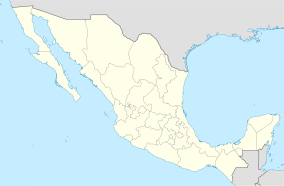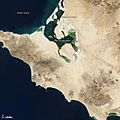El Vizcaíno Biosphere Reserve facts for kids
Quick facts for kids El Vizcaíno Biosphere Reserve |
|
|---|---|
|
IUCN Category VI (Managed Resource Protected Area)
|
|

A pelican on the coast of the El Vizcaíno Biosphere Reserve
|
|
| Location | Baja California Sur, Mexico |
| Nearest city | Mulegé Municipality |
| Area | 55,555 km2 (21,450 sq mi) |
| Established | 1988 |
| Official name: Whale Sanctuary of El Vizcaino | |
| Type: | Natural |
| Criteria: | x |
| Designated: | 1993 (17th session) |
| Reference #: | 554 |
| Region: | Latin America and the Caribbean |
The El Vizcaíno Biosphere Reserve is a huge protected area in Mexico. It was created in 1988 to protect its amazing wildlife and unique landscapes. You can find it in the middle of the Baja California Peninsula, between the Pacific Ocean and the Gulf of California. It's the biggest wildlife refuge in all of Mexico, covering more than 24,930 square kilometers! That's a lot of space for animals and plants to live safely.
This special place is also a World Heritage Site. This means it is recognized by UNESCO as having outstanding universal value. It's especially known as a safe place for gray whales to have their babies.
Contents
History of El Vizcaíno
People have lived in the El Vizcaíno region for a very long time. The first groups arrived over eleven thousand years ago. They might have been nomads, meaning they moved from place to place, traveling from the north of the American continent. Others might have traveled along the coast in boats.
Later, the Cochimi people lived here. They were "foragers," which means they found their food from nature. They used the resources from the coast, the flat inland areas, and the Sierra de San Francisco mountains. If you visit the mountains, you can still see their ancient cave art.
Spanish explorers first came to this area in the 1500s. Juan Rodríguez Cabrillo was the first to sail along the coast. Later, in 1596, Sebastián Vizcaíno explored the land inside what is now the reserve. The reserve is named after him!
Amazing Animals of El Vizcaíno
The El Vizcaíno Reserve is home to many animals that have learned to live in its dry, desert-like conditions. Some animals are nocturnal, meaning they are active at night when it's cooler. These include coyotes, rodents, and hares. Other animals get all the water they need from the plants they eat.
Land Animals
One very special mammal here is the Baja California pronghorn. This animal is a type of Pronghorn, and it's one of the fastest mammals on Earth! The last groups of these amazing animals live in this reserve.
You can also find desert bighorn sheep and Mule deer in the reserve. These animals are well-adapted to the desert environment.
Birds and Sea Creatures
Many different kinds of birds live in El Vizcaíno, including both birds that stay all year and those that migrate. You might see ospreys, cormorants, herons, and gulls.
The coast and small islands are important for marine animals. Four types of sea turtles live here. You can also spot large marine mammals like northern elephant seals and California sea lions. Dolphins swim in the waters, and the reserve is a famous place for gray whales. Gray whales come here to have their babies in the warm, protected lagoons.
Images for kids
See also
 In Spanish: Reserva de la biosfera El Vizcaíno para niños
In Spanish: Reserva de la biosfera El Vizcaíno para niños
 | Sharif Bey |
 | Hale Woodruff |
 | Richmond Barthé |
 | Purvis Young |



